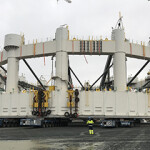East Coast Seafood announces closure of Groton facility
East Coast Seafood announced on 14 January that it plans to close the Garbo Lobster facility in Groton, Connecticut, U.S.A., effective Thursday, 17 January.
The lobster packing facility was used as a base of operations for shipping live lobsters and billed itself as the largest wholesale distributor of live lobsters in the world. According to a release from East Coast, the company plans to absorb those operations into its other facilities and will be working with employees of the Groton facility.
“To assist, the company will be absorbing benefit costs of covered employees for a period of time, offering severance to each employee affected, and providing recommendation letters and other support requested by employees during their transition to other employment opportunities,” East Coast wrote in a prepared statement. “The lobster packing operation will be absorbed into the company’s other facilities throughout the northeast.”
East Coast currently operates other lobster facilities in Maine and Atlantic Canada.
The Groton facility was used as a base of operations for wholesale shipment of live lobsters, with a large percentage of business going to China.
While East Coast has declined to give a reason for the closure of the facility, the ongoing China-U.S. trade war has had a heavy effect on U.S. lobster exports. Chinese tariffs on U.S. seafood, which went into effect on 6 July, 2018, had an immediate effect on East Coast’s shipments to China, Garbo Lobster General Manager Chris Brown told NBC Connecticut in August.
"We experienced an immediate shut off of business,” Brown said. “We were shipping anywhere 100,000 to 150,000 pounds a week on a given timeframe to China, however now that has dropped down to nothing.”
Since that time, the trade war has shown small signs of slowing down. A temporary truce was reached in early December between U.S. President Donald Trump and Chinese President Xi Jinping, with Trump agreeing to postpone a ramp-up of tariffs. Initially, U.S. tariffs on Chinese goods was scheduled to increase from 10 to 25 percent on 1 January, but an agreement between the two countries has delayed that until March.
That delay, however, did not undo the tariffs still being imposed by China on live shipments of lobsters from the United States. In addition, China recently lowered tariffs on seafood imported from certain trading partners.






Share